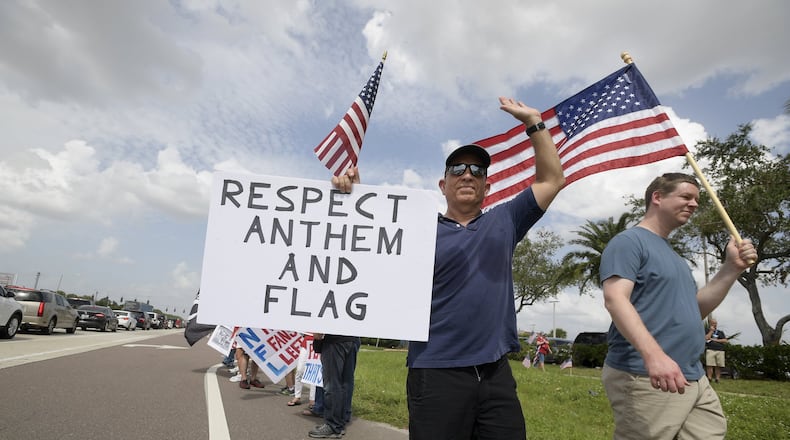Some of my readers aren’t happy.
They are, in fact, downright angry that I would, one, criticize the President and, two, disrespect the American flag by suggesting that it’s OK for NFL players to take a knee during the national anthem to express displeasure with police brutality toward African-Americans.
And so after my column, NFL unity trumps President's hate speech, was published last week, they let me have it.
“How would you respond if your surgeon took a knee during your operation?” one them wrote in an email. “Or how about if your pilot took a knee during the takeoff or landing? If I buy a ticket to a sporting event or a concert, I shouldn’t be subjected to anything other than the entertainment for which I pay.”
Another reader, who described himself as “a patriotic American and Disgusted AJC Reader,” said the flag and anthem are symbols of the sacrifices made by millions of Americans. To suggest it’s OK to take a knee during the anthem, he said, “has become standard rhetoric for the liberal left whose words and actions show they are not patriotic Americans, and whose overall agenda is clearly to ruin America!”
Based on the likes and retweets the column received on Twitter, I have to assume there are readers who agree with me. But neither they nor the dissenters responded to my request to talk.
Of course, one of the reason we have this problem is because we only engage people who agree with us.
Interestingly enough, I was struck recently by the number of veterans who have spoken out in favor of the NFL protests.
Marie Tillman, wife of veteran Pat Tillman, weighed in recently in a Washington Post article.
“The very action of self-expression and the freedom to speak from one’s heart — no matter those views — is what Pat and so many other Americans have given their lives for. Even if they didn’t always agree with those views.”
Tillman gave up his Arizona Cardinals contract to serve the United States in the wake of the 9/11 attacks. He was killed in a friendly fire incident in 2004 in Afghanistan.
And so here’s the question that, at least for me, has loomed large since the president re-ignited this debate: How did we get here?
Erin C. Tarver, an assistant professor of philosophy at Oxford College of Emory University, is both a life-long sports fan and author of the new book, "The I in Team," which analyzes sports fans and identity. She thinks she knows the answer.
“Many white fans are happy to root for black men on the field, but unwilling to accept them as full human beings,” she said.
Indeed, it wasn’t until the 1970s, nearly three decades after Jackie Robinson broke the color line in baseball, that sports became a genuine meritocracy because it took that long for teams to be fully integrated.
“We like to think that sports are the great equalizer, a way of bringing people together despite their differences,” Tarver said. “This might sometimes be true, but there are serious reasons to doubt whether this pretty picture is accurate. In many cases, what we see is the opposite — that racism finds a way to evolve and adapt to integration.”
Like Malcolm X, Tarver believes that many white fans treat black athletes more like mascots than full members of the team, and they will withdraw their support if players don’t do what fans expect of them or when they’re no longer useful.
“In other words, when they remind fans that they’re real human beings,” Tarver said.
Donald Trump’s response to the protest, she said, is part of this pattern.
Tarver believes white fans’ angry reactions expose the precarious relationship between those fans and the black and brown players they root for.
So, where do we go from here?
First, Tarver says sports fans, whites especially, need to do some serious soul-searching.
They should ask themselves why they are so angry when an athlete voices an opinion.
Why are they more angry about the protest than about what these folks are protesting?
“Most white fans who have these visceral reactions, in my experience, haven’t stopped to examine them, to be self-critical,” she said.
Second, fans need to recognize the full humanity of the men they cheer for on the field.
That requires respecting their dissent when it occurs.
And third, listen to the athletes and take their views and insights seriously.
“I was glad to see Eric Reid (of the 49ers) publish an Op-Ed
in the New York Times this week laying out the rationale behind his decision to protest with Colin Kaepernick,” Tarver said. “These players have important things to say. If we can watch them risk their bodies and lives on the field, we can listen to their ideas.”
Let’s hope so.
About the Author
The Latest
Featured





